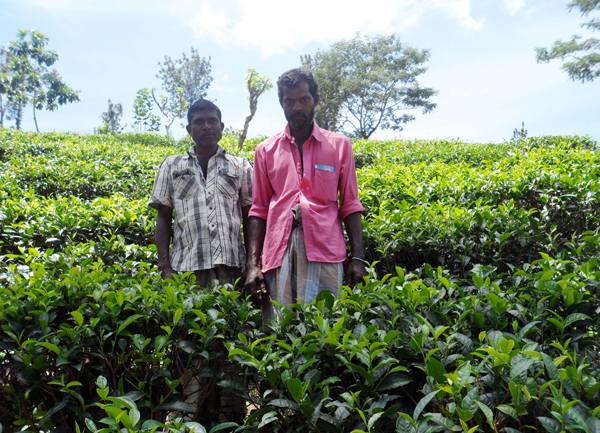Outgrower system succeeds at Endana Estate
View(s):The outgrower model in Sri Lanka’s tea industry dogged for many years by rising costs, seen as a viable alternative to the traditional tea plantation management system is working at least in one plantation.
Endana Estate, in Ratnapura, an estate belonging to the Regional Plantation Company (RPC), Kahawatta Plantations PLC, says its new ‘outgrower model’ is now generating dividends for both the estate and employees. One of the nine Kahawatta Plantation estates located in the central mountainous region in the foothills of the Sinharaja Rainforest Reserve in Kahawatte, Endana Estate cultivates, tea, rubber and cinnamon. Over the past eight years, the estate has been gradually testing an outgrower system for its tea cultivation. The Endana estate management said, in a statement issued by the Planters Assocation (PA), that outgrowing has surged in popularity among estate employees, and has helped increase employee incomes. It has also raised estate productivity and profitability.

Workers on Endana estate
Under this scheme, the employees take care of the tea bushes and also harvest the tea leaves, for which they are paid according to a standard, transparent formula. The RPC, which owns the land, provides the outgrower with fertilizer and other technical expertise. To ensure quality of the plucked tea leaves, the RPC extends its standard estate supervision to the outgrower plots.
The system differs from the smallholder model, as the ‘outgrowers’ do not own their small plots of tea land, as in the case of small holders. Under the outgrower model, the plantation company continues to have full ownership and control of the plantation lands, which allows plantation management to supervise the outgrower plots.
“We enter into outgrower arrangements with our employees by giving them about 1,000 – 1,200 bushes of tea, to look after. We also help them by teaching them the correct agricultural practices to take care of the tea bushes and how to maintain the quality of the tea leaf,” noted Sujeewa Godage, former manager of Endana Estate and now Deputy General Manager of the Kahawatte Region, at Kahawatte Plantations.
The estate, which buys the outgrower leaf, pays the outgrower 64 per cent of what it pays small holders for small holder green leaf. The balance 36 per cent of the payment is injected back into outgrower plots in the form of fertilizer and other inputs.While the outgrower model is being practiced by many local plantation companies for various reasons and at different levels, what is unique about Endana Estate is that over half the estate’s tea cultivation is undertaken by outgrowers.
“Originally, when we started this system about eight years ago, only a very small patch of tea was brought under outgrowers. But now, around 250 hectares, which is about 60 per cent of the total estate, is being managed under the outgrower system,” said Mr Godage.
The popularity of the system is due to its direct and speedy benefits for estate employees, says the PA. While estate employees work on the estate during regular working hours, they are free to tend their outgrower plots after work and during weekends. As outgrower families get involved in the management of their tea plots, it is possible to harvest tea leaves throughout the week. The result has been an additional stream of revenue for estate families.
“Estate employee’s incomes have increased by Rs 8,000 – Rs 12,000 per month. This is in addition to their normal wage from their estate duties,” added Mr Godage.
The system has also addressed the long standing problem of dignity of labour in plantations. As the plots of land are managed by estate families, there is greater ownership in the management and less stigma attached to estate work.
Another significant benefit has been the reduction in the out migration of estate labour. Endana, like many low country estates in Sri Lanka, suffered from labour shortages for years. Estate employees, although registered with the estate, did not report to work in the estate. Many preferred to try their luck in the gem pits of neighbouring Ratnapura, while others found work in the towns and some went to work in neighbouring small holdings.
“Previously even out of the registered workers, about 40% did not come to work regularly. So this had a severe impact on overall estate yield and productivity, because we did not have enough workers to pluck the tea,” he said.
As a result nearly 100 hectares of land was not being cultivated due to labour shortages. Even today, if examined against the traditional estate management model, Endana is severely short-handed, requiring nearly double the workforce it currently has. However, because of the outgrower system Endana no longer has uncultivated, idling tea land. As Endana estate gives outgrower rights only to its full time estate employees, employees are also more enthusiastic about coming to work.
Follow @timesonlinelk
comments powered by Disqus





















